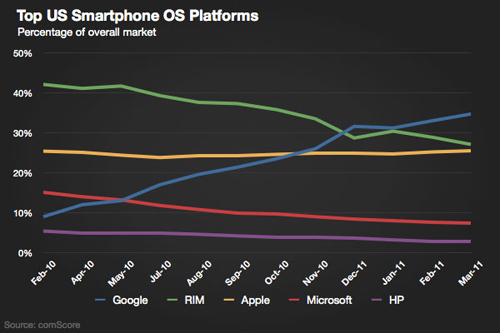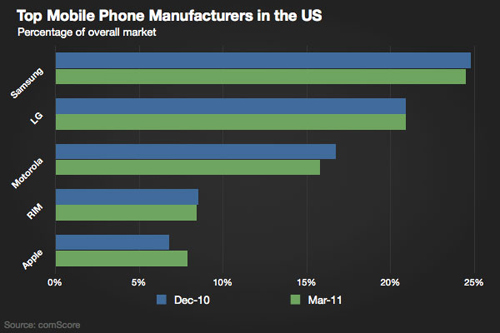调查称第一季度苹果在美智能手机市场份额达25.5%
据分析公司comScore最新调查结果显示,谷歌Android操作系统仍是2011年第一季度美国智能手机市场冠军,其所占份额从原来的28.7%攀升至34.7%。苹果的份额从25%略增至25.5%,苹果的市场份额增长部分归功于该季度威瑞森iPhone的220万手机销量,但主要原因还是RIM在美国市场的失势。
黑莓的市场份额比三个月前下降了4.5%,目前所占比例是27.1%,而在一年以前,RIM在美国智能手机市场份额曾高达40%。惠普的市场份额为2.8%,微软则从7.7%降至7.5%,这表明Windows Phone 7并没有阻止微软手机市场份额的下滑。
该报告表明,即使苹果新款iPhone不会在6月份问世,它在美国的智能手机市场份额也仍将在今年夏季超越RIM(游戏邦注:其在全球智能手机市场份额已超越RIM)。从硬件设备市场来看,苹果也仍将打败RIM。
在手机设备制造领域,苹果iPhone在第一季度的市场份额已从原来的6.8%上升至7.9%,开始逼近RIM所占比例。目前苹果是全美排名第四的手机设备制造商,有望在今后三个月内赶超RIM。而RIM的手机设备市场份额已从原来的8.5%下跌至8.4%。排名第三的是摩托罗拉,其份额下降将近一个百分点,目前是15.8%。从目前这种趋势来看,苹果很可能在明年此时成为全美第三大手机设备制造商。
尽管Android在智能手机市场更胜一筹,但在平板电脑和媒体播放器市场上,Android等其他竞争对手仍无法撼动苹果iPad和iPod touch的地位。据comScore分析,iOS用户安装率约59%,远胜于Android用户的安装率。Android平板电脑尚无影响整个平板电脑市场的能力,尽管三星推出了Galaxy Player,但iPod touch仍是市场上的媒体播放器之王。
如果不看智能手机市场,而是考虑所有移动设备操作系统的市场份额,Android要效仿微软在传统计算机领域的成就,成为当今移动设备市场领军力量的概率非常小,这也就意味着iOS平台不会成为Mac在90年代末翻版——它不太可能局限于小众市场,而这正是苹果用户最在乎的一点。(本文为游戏邦/gamerboom.com编译,转载请注明来源:游戏邦)
iPhone Holding on Against Android as RIM Collapses
According to analytics firm comScore , smartphone OS market share continues trending Google’s way in the U.S. Counting some 75 million mobile subscribers for the three-month rolling average ending
in March, Android climbed to 34.7 percent, up from 28.7. That six-percentage-point increase is less than Android’s growth in the previous quarter, but still big. Apple saw a little growth, from 25 to 25.5 percent, which was about double that of the previous three-month period. The rise can possibly be attributed to some 2.2 million Verizon iPhones sold during the quarter, though the collapse of RIM is probably having a larger impact.
The BlackBerry maker saw its share decline to 27.1 percent, down 4.5 percent from three months ago. To put that in perspective, a year ago RIM accounted for about 40 percent of smartphone OS market share in the U.S. It’s hard to imagine anything worse than that, except for Microsoft and Palm, both of which have seen their market share halved from a year ago. While HP remains flat at 2.8 percent of the market, Microsoft dipped from 7.7 to 7.5 percent, suggesting Windows Phone 7 has failed to stop the company’s decline.
What this means for Apple is that, simply by not failing like its competitors, and even without a new iPhone in June, Apple will pass RIM in terms of U.S. smartphone OS market share this summer. (It already did so in the global market.) Not surprisingly, the same can be said for handset share, too.
Apple is closing on RIM in the race among handset OEMs, with the iPhone climbing from 6.8 percent to 7.9 percent in the last three months. Currently fourth in the U.S., Apple will pass RIM in the next three months, as the Canadian company saw its own share of handsets decline from 8.5 to 8.4 percent. In third, Motorola dropped nearly a full percentage point, down to 15.8 percent. If current trends continue — and there’s nothing to suggest they won’t — Apple could be the third-largest manufacturer of phones in the U.S. by this time next year.
Going back to Android’s dominance in smartphone operating systems, it should be noted that including tablets like the iPad and handhelds like the iPod touch, the numbers change drastically.
According to comScore, as of just last month, the combined installed base of iOS users was some 59 percent greater than that of Android users. That’s important because, to date, Android tablets have failed to significantly impact the tablet market. Currently, there is no competition for the iPod touch, though Samsung is launching the Galaxy Player against Apple’s media player supermajority. Good luck with that.
The takeaway here is that accounting for mobile operating systems across devices, instead of just on smartphones, Google’s chances of achieving the kind of dominance in mobile computing that Microsoft did with traditional computers is much less likely. That means the iOS platform won’t become a niche market the way the Mac did in the late ’90s, and that’s what really matters for Apple’s customers.(source:gigaom)









































 闽公网安备35020302001549号
闽公网安备35020302001549号